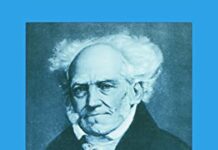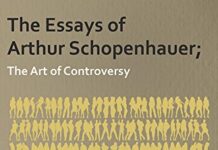
Ebook Info
- Published: 1973
- Number of pages: 240 pages
- Format: EPUB
- File Size: 3.36 MB
- Authors: Arthur Schopenhauer
Description
This selection of thoughts on religion, ethics, politics, women, suicide, books, and much more is taken from Schopenhauer’s last work, Parerga and Paralipo-mena, published in 1851.For more than seventy years, Penguin has been the leading publisher of classic literature in the English-speaking world. With more than 1,700 titles, Penguin Classics represents a global bookshelf of the best works throughout history and across genres and disciplines. Readers trust the series to provide authoritative texts enhanced by introductions and notes by distinguished scholars and contemporary authors, as well as up-to-date translations by award-winning translators.
User’s Reviews
Editorial Reviews: About the Author Arthur Schopenauer was born in Danzig in 1788, where his family, of Dutch origin, owned one of the most respected trading houses. In 1793 the business moved to Hamburg, and in 1805 Arthur, who was expected to inherit it, was apprenticed as a clerk to another Hamburg house. He hated the work, so in 1807, two years after his father’s suicide and the sale of the business, he enrolled at the grammar school at Gotha. In 1809 he entered Göttingen University to study medicine and science; the following year he took up philosophy. In 1811 he transferred to Berlin to write his doctoral thesis (1813). During the next four years he lived in Dresden and wrote The World as Will and Idea (1818), a complete exposition of his philosophy. Although the book failed to sell, Schopenhauer’s belief in his own philosophy sustained him through twenty-five years of frustrated desire for fame. During his middle life, he traveled widely in Europe. In 1844 he brought out a greatly expanded edition of his book, which after his death became one of the most widely read of all philosophical works. His fame was established in 1851 with the publication of Parerga and Paralipomena, a large collection of essays, dialogues and aphorisms. From 1833 until his death from a heart attack in 1860 he lived in Frankfurt-am-Main.R. J. Hollingdale has translated eleven of Nietzsche’s books and published two books about him. He has also translated works by, among others, Schopenhauer, Goethe, E. T. A. Hoffmann, Lichtenberg and Theodor Fontane, many of these for the Penguin Classics. He is Honorary President of the British Nietzsche Society, and was for the Australian academic year 1991 Visiting Fellow at Trinity College, Melbourne.
Reviews from Amazon users which were colected at the time this book was published on the website:
⭐Arthur Schopenhauer wrote his essays and aphorisms in the financial hub city of Frankford, Germany during the mid-nineteenth century, a world where business owners and financiers ruthlessly competed against one another to amass fortunes, clerks chained to their desks toiled twelve hours a day, uneducated day laborers ground themselves down into faceless, mindless cogs of the urban wheel, and upper class ladies strolled the streets with parasols as they chattered incessantly over petty concerns – but, no matter what one’s station in life – ruthless financial baron, toiling clerk, chattering lady or manual drudge – the monotonous hum of this bustling society gave few people encouragement or mental space to think independently or reflect philosophically. But no hustle and bustle for Arthur. Inheriting the family fortune and thus freed from any obligation to work for a living, Schopenhauer became a life-long bachelor and independent scholar, keeping his distance from other people as if they were a colony of doltish, novel-reading lepers. And, thus, after rousing in the morning and before playing the flute, partaking of lunch, and going for his two hour walk with his pet poodle, Schopenhauer sat at his desk, completely dedicating his time to writing. And this collection is Schopenhauer at his hyper-arrogant best, as self-appointed genius and highbrow aesthete, shooting verbal barbs and passing harsh judgment on everyone and everything in sight – would-be philosophers, journalists, bookworms, scholars, literati, historians, women, among numerous others.This book is great literature as well as original philosophy, the writing is so incredibly clear, crystal clear, actually – a straightforward, easy-to-follow, elegant prose. What a switch from hopelessly dry, turgid, stale academic philosophy with its endless references, footnotes and qualifications. On the topic of books and writing, here is a quote which is vintage Schopenhauer: “The thoughts a man is capable of always express themselves in clear, comprehensible and unambiguous words. Those who put together difficult, obscure, involved, ambiguous discourses do not really know what they want to say: they have no more than a vague consciousness of it which is only struggling towards a thought; often, however, they also want to conceal from themselves and others that they actually have nothing to say.” Keep this in mind the next time you read an incomprehensible piece of writing – in truth, the burden is on the writer to make their thoughts clear, no matter how impressive the author’s credentials.Among the topics address is aesthetics. As always, Schopenhauer never dances around an issue but goes right to the heart of the matter and tells it like it is. Here is what he has to say on opera: “Strictly speaking one could call opera an unmusical invention for the benefit of unmusical minds.” For anybody with a keen interest in listening to music, these words have a very honest ring.Here is a quote that is especially appropriate to our current age of information: “Students and learned men of every kind and every ago go as a rule in search of information, not insight. They make it a point of honor to have information about everything . . . When I see how much these well-informed people know, I sometimes say to myself: Oh, how little such a one must have had to think about, since he has had so much time for reading!” The truth of this statement is compounded with the omnipresence of the internet.One more quote, this one capsulizing Schopenhauer’s famous pessimistic view of life: “No rose without a thorn. But many a thorn without a rose.” Even if you don’t agree, you have to admire a brilliant, memorable metaphor. If you are new to Schopenhauer or philosophy, R. J. Hollindale provides an introduction which includes a mini-history of philosophy leading up to Schopenhauer, the cultural, literary and social context of Germany in the nineteenth century, as well as a mini-biography of Schopenhauer. This will be all you will need to have a rich appreciation for one of the most lucid and influential philosophers in the Western tradition.
⭐This is not a selection of AS’s works but rather a selection from a single work, PARERGA AND PARALIPOMENA (1851), though AS makes reference therein to his major work, THE WORLD AS WILL AND REPRESENTATION. The book is divided into ‘essays’ and ‘aphorisms’, though some of the essay sections contain subdivisions that are quite brief and some of the aphorisms sections extend to essay length. While AS is a significant philosopher the writing here is very accessible (if not commonplace in its attitudes). AS is often characterized as a dark and pessimistic thinker but he is nonetheless interesting and engaging in his points of view. The introduction by R.J. Hollingdale is very helpful in placing this work in the larger contexts of its times, of AS’s life and the totality of his oeuvre.He is a master of the bon-mot. Two examples:”If you want to know how you really feel about someone take note of the impression an unexpected letter from him makes on you when you first see it on the doormat” (p. 171).”Great minds are related to the brief span of time during which they live as great buildings are to a little square in which they stand: you cannot see them in all their magnitude because you are standing too close to them” (p. 226).While many commentators warn readers about AS’s gloominess I find him somewhat uplifting. He never shies away from saying what he believes. He talks about subjects that other philosophers might hesitate to discuss and when the times are trying he reinforces the feelings about the world and its inhabitants which you are trying to resist. Several things to keep in mind: he idolizes Kant, is generally contemptuous of Hegel and he believes that his thought was never recognized in the manner which it deserved. The latter feeling undergirds a number of his trenchant, pungent and engaging comments on the world of literature, letters and philosophy.A familiarity (even a brief one) with AS’s thought is an essential part of one’s philosophic education.
⭐If you buy this you’re surely aware of Schopenhauer anyway and don’t need to hear my opinion of this pessimistic (realistic) genius who saw the world as it was and made a huge contribution to c19 philosophy, although some of his views are clearly of their time. This is a beautiful edition, small enough to travel with, substantial enough to justify the price.
⭐Bit of a mixed bag this – it’s a compilation of snippets from Schopenhauer’s essays. Forget the introduction though by Hollingdale – he overemphasises Schopenhauer’s pessimism due to his own Nietzschean proclivities.
⭐Amazing. Probably my favourite philosopher. I especially respect the essays on writing (being an artist/creative genius), ‘The Will to live’ and suicide. As a woman I even think the essay on women was probably relevant for its time.
⭐A Penguin classic. It is published by Penguin so you can be reasonably confident that you’ll get the correct version.
⭐Great.
Keywords
Free Download Essays and Aphorisms (Penguin Classics) in EPUB format
Essays and Aphorisms (Penguin Classics) EPUB Free Download
Download Essays and Aphorisms (Penguin Classics) 1973 EPUB Free
Essays and Aphorisms (Penguin Classics) 1973 EPUB Free Download
Download Essays and Aphorisms (Penguin Classics) EPUB
Free Download Ebook Essays and Aphorisms (Penguin Classics)




